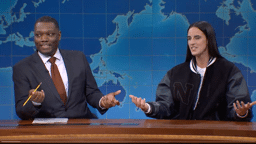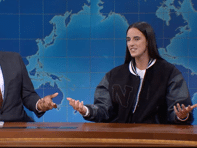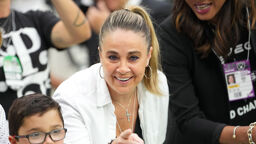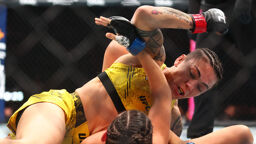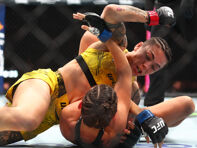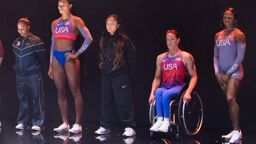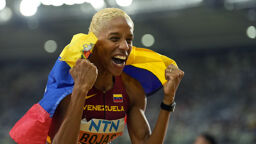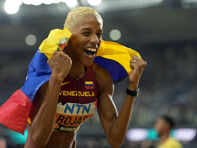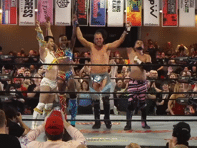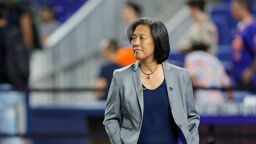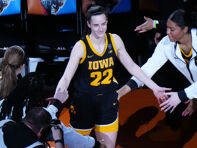So Johnny Weir skated a freestyle program that brought the crowd to its feet. He had entered the finals far enough behind (6th) that the punters had given him only a long shot at bronze. But there was a moment, as NBC commentator Scott Hamilton yelled, "That's the best that I've seen him do!" and Johnny left the ice, that it seemed like he might get 3rd place. Instead, it was Takahashi who got the bronze. Johnny Weir got buried in 6th place. So what went wrong for him?
So Johnny Weir skated a freestyle program that brought the crowd to its feet. He had entered the finals far enough behind (6th) that the punters had given him only a long shot at bronze. But there was a moment, as NBC commentator Scott Hamilton yelled, “That’s the best that I’ve seen him do!” and Johnny left the ice, that it seemed like he might get 3rd place. Instead, it was Takahashi who got the bronze. Johnny Weir got buried in 6th place. So what went wrong for him?
Despite figure skating's efforts to de-politick itself, it is still very political. After that judging scandal at the 2002 Salt Lake City Games, embarrassed figure-skating authorities put a complex new scoring system in place. It was supposedly aimed at minimizing the impact of a judge's personal bias. But juries in murder trials can be prejudiced by what they hear on the news. Why not skating judges as well?
By this morning, all over the world, many sports pundits and skating fans were scratching their heads over the call on Weir. And they weren't all LGBT fans who are convinced that the judges were homophobic. I went to Google and searched under "Johnny Weir was robbed" — and was amazed at the pages and pages of comments that come up. Scott Hamilton, who also happened to be 1984 gold medalist in men's figure skating, stated bluntly that Weir had been underscored. Even Elvis Stojko, who is trying hard to get "effeminate" skaters like Weir out of the sport, wrote on Yahoo, "Johnny Weir should've been higher than sixth."
Under a title that read in part, "Why the Judges Don't Like Johnny Weir," the Christian Science Monitor's staff sportswriter Mark Sappenfield blogged his own analysis of last night's judging: "Despite a flawless performance, he finished sixth. Part of that, he acknowledged, was because 'I did a lot of leave-outs,' lowering the difficulty of his routine. Yet his execution kept him in medal contention. His technical score of 79.67 was 6.19 points higher than that of bronze medalist Daisuke Takahashi. So how did Weir lose his chance at bronze? Simply put, the judges didn't like his routine much. Weir scored 77.10 points in the more subjective program components. Takahashi scored 84.50 – 7.4 points higher."
My old friend Skip Mackall, out skating figure who is doing a radio show during the Olympics, had his own different analysis. He emailed me: "Well, you know I'm a Johnny fan, but under the scoring system he missed the mark on some areas. The music is to be changing ie. fast, slow, fast. Also his program didn't change directions often enough, Both triple lutz jumps were weak on edge (they kinda became flip jumps…flip is inside edge, lutz outside). I think 4th was a more realistic placement."
But if the judges did express any non-skating bias in the “more subjective” area, what was that bias? Was it about Johnny’s off-the-ice flamboyance? The hinting that he’s gay but never saying it? The pink ribbons in his costume? And how can pink ribbons be an issue when “Think Pink” is a breast-cancer campaign and even rodeo cowboys are wearing pink?
Were the judges also rankling against Johnny over non-sexuality issues? Like his running battle with PAWS? Were they resentful of the high-powered ads for his new TV show, which aired right during the competition? Johnny was the only figure skater who got that kind of visibility in Vancouver.
Barring an investigation, we may never know what skewed that scoring.
One thing we do know: Johnny was open about wanting to erase the public's memory of his disastrous performance at Torino in 2006. He went back to the Winter Games to get that monkey off his back. He left out the quad jump at the last moment (always a skater's option) to make sure he could finish without a fall. Meanwhile he kept saying that he intended to "be himself." Weir knows the icy politics as well as anybody, so he surely knew that "being himself" in Vancouver might cost him. And maybe it did.
So far, in Weir's statements to the press, he's being gracious about what happened. (Unlike Plushenko, who is boiling over with sour grapes.) Johnny's career is clearly moving away from skating competition, into other realms of performance — fashion, entertainment and celebrity. The important thing is — he goes into his future with a clean slate. The public — including his huge international fan base — knows he had a victory in Vancouver, whether he stood on the podium or not.



















